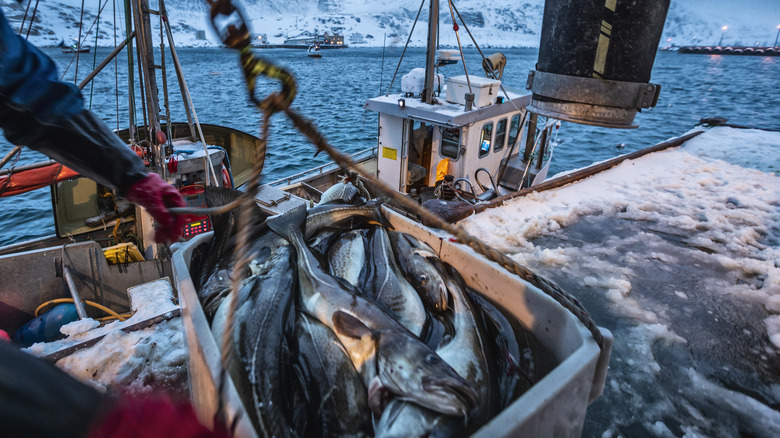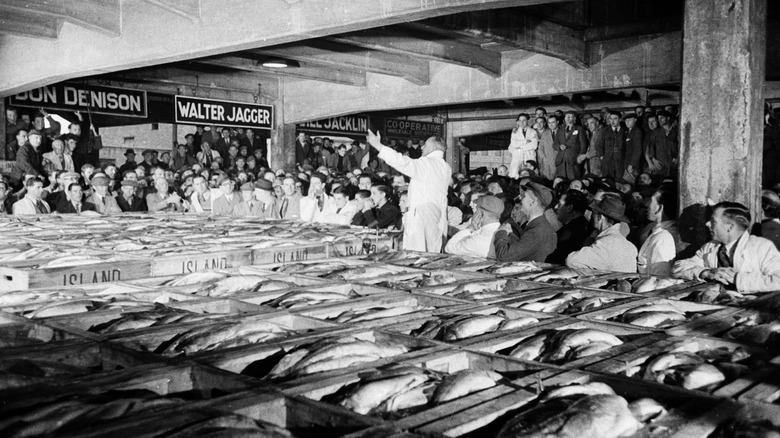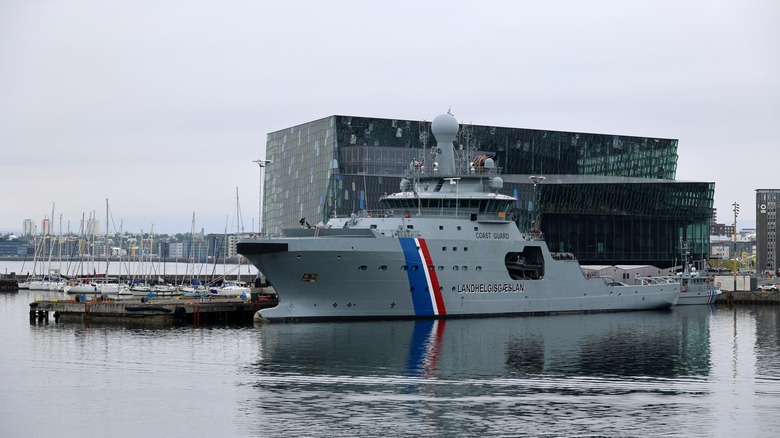Why 4 Actual Wars Broke Out Over Cod Fish
It's not unusual for neighboring nations to occasionally knock heads, and sometimes even go to war, over valuable resources and disputed territories. But for northern NATO nations Iceland and Great Britain, there were four major confrontations over almost as many decades. Between the late 1940s and mid-1970s the two seafaring countries went to war, so to speak, over fishing rights.
These skirmishes are appropriately named the Cod Wars, or "the cod strife" in Icelandic. Codfish is popular around the world and was once even considered a luxury breakfast food in the States. Many European countries rely on the fish for traditional meals as well, like Portuguese salt cod with bread and garlic. The cultural and economic necessity of cod for Iceland led to repeated clashes with Britain over the highly productive fishing territory of the northern sea.
These incidents are called "wars," but there were no bombs dropped or official declarations of such; Iceland is, in fact, the only NATO member without a military. What transpired over the mid-twentieth century was a series of hard-fought skirmishes between once-warm neighbors over resources and boundaries. The financial, political, and physical clashes spanned decades, with trawling nets slashed, warning shots fired, and Royal Navy ships rammed.
Thanks to steadfast national resolve, some clever leveraging of global political tension, and nonlethal counterinsurgent techniques, the northern microstate of Iceland stood its ground against the global superpower of Great Britain. And in all four of the Cod Wars, the smaller of the two nations emerged victorious.
Financial fears and fishing grounds
In Iceland, fishing is a traditionally vital source of food (though not for all tastes, as one of their delicacies, hákarl, was what Anthony Bourdain said was the worst he ever ate). Fishing also made up almost 90% of Iceland's export economy, so it was understandably protective of this financial and cultural cornerstone.
The first Cod War kicked off in 1952, after a modest increase in Iceland's territorial waters from three to four nautical miles. Over the following decades, Iceland would further expand its exclusive economic zone (or EEZ), and Britain would continue not recognizing the expanding restricted waters. These disagreements escalated to include aggressive action by the Icelandic Coast Guard, the involvement of the Royal Navy, and diplomatic intervention by NATO.
Iceland's initial territorial increase incurred financial backlash; the British closed their ports to the country's ships, refusing fish imports. Iceland opted instead to send fish to the Soviet Union, becoming the first NATO country to engage in trade with the country. Iceland understood its value as a NATO member and leveraged global political tension to make a point.
This eventually caused the UK to concede the first Cod War in 1956. Only two years later, however, Iceland expanded its territorial waters further, sparking another clash between the two nations. This pattern repeated twice over the next twenty years, with overfishing and dwindling numbers of cod pushing Iceland to expand its fishing territory to a 200-mile limit in 1975.
Trimming trawls and ramming hulls
What Iceland lacked in a navy, it made up for in unwavering public support at home and nautical law enforcement that was ready to get creative. The Icelandic Coast Guard employed destructive methods meant to deter British ships from their EEZs, which resulted in two deaths.
All seven of Iceland's Coast Guard boats were equipped with tools to snag and cut the British trawlers' nets, letting loose the precious catch and rendering the boats useless until they could be repaired. Britain responded by diverting naval resources to the matter, with Royal Navy ships accompanying fishing expeditions as a means of protection. During the latter Cod Wars, as tensions escalated, Icelandic gunboats and British frigates took to ramming one another, each trying to disrupt and protect the others' conflicting interests.
The Coast Guard wasn't out for blood, but rather to make fishing in their territory more costly and troublesome than it was worth. But things did heat up in the '70s with 35 ramming incidents in just six months, gunboat standoffs, and the dissolution of diplomatic relations. The protests and outcry by Iceland's people helped sway public opinion; they cried 'imperialism' and rebuked the economic bullying of their once-friendly neighbor.
NATO repeatedly pressured Britain to accept Iceland's terms, as it was clear they had no intention of backing down. So in 1976, after mediated talks, Britain caved. The small country of Iceland had repeatedly proven its resolve and ultimately won all four of the Cod Wars.



